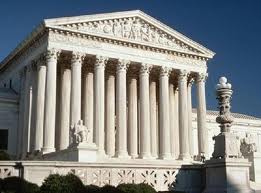 |
| Free image of the Washington, DC, Mormon Temple at http://www.ldschurchtemples.com/washington/gallery/ |
I think one of the most fascinating developments in current religious history is what seems to be happening in the
Mormon Church.
Frankly, I have not been a fan.
However, what appears to be happening within Mormonism these past years is the emergence of the capacity for the objective study of Mormon history by Mormons, even when the facts are not complimentary. Mormons seem to be beginning to develop the capacity to be self-aware and self-critical.
This is when, it seems to me, a religious movement begins to reach maturity and the potential for true spiritual depth: when you can be faithful and self-critical at the same time.
Maybe the other indication of maturity is when you can have a sense of humor about the oddities and failings of your own religious group.
The first writer who gave me a sense that something new might be happening in Mormonism is Janet Riess whose articles began appearing in the
Christian Century magazine in 2007. She wrote an article for the
Century entitled
"We're Christian Too" just after she had published her book
Mormonism for Dummies.
 |
| Janet Riess |
It was Riess's 2011 article in the
Century entitled
"Normal Mormons" that heightened my realization that, along with the religion's emphasis on propaganda (which they have done particularly well), an objective scholarly analysis of Mormonism has been emerging.
Read this paragraph from "Normal Mormons":
There's no question that Mormon theology is subtly changing. The real
question is how far it will bend to accommodate its host culture and
where will it seek to reestablish its distinctiveness. Historians such
as Jan Shipps, Thomas Alexander and Kathleen Flake have argued that
whenever Mormonism has had to give up something central in order to
assimilate into American culture, it has tended to compensate by
hardening its position in other areas. For example, when polygamy was
jettisoned in the late 19th and early 20th centuries, the Word of Wisdom
(the Mormon dietary code that eschews coffee, tea, alcohol and tobacco)
assumed a position of prominence. Early generations of saints had
adopted a relaxed view of the Word of Wisdom, as is evident in the
sanctioned presence of wine at early Mormon temple dedication
ceremonies, the appearance of coffee on the list of required provisions
for saints undertaking the arduous journey west to Utah, and Brigham
Young's decades-long struggle to stop chewing tobacco. But once polygamy
was disavowed, the Word of Wisdom became one of the most important
markers of LDS identity.
Fascinating!
The development of both scholarly Mormon historians, called the
New Mormon historians, and more popular writers like Janet Riess who balance their commitment to Mormonism with a commitment to telling the story of Mormonism objectively and truthfully seems to me very healthy. We should applaud it.
Steve Evans wrote
an essay for the
Washington Post "On Faith" page recently about the fact that, for the first time in the history of the Mormon Church, women will offer an invocation or benediction at the
church’s worldwide General Conference, coming this April 6–7.
Even though Evans does not believe women praying at General Conference for the first time changes everything, he says:
But still -- this really matters. In a church run by patriarchy, women
can feel that their opinions are irrelevant. If this is happening
because church leaders are responding to recent letters and voices, that
is a very good thing indeed. It reinforces my belief in my religion.
I think there is a relationship between a religion's capacity to read its own history self-critically and its ability to change.
Being able to have a sense of humor about yourself also helps.
Janet Riess, who writes a
blog for
Religion News Service, is sometimes very funny. In one blog entitled
"Three Things I Wish Non-Mormons Knew About LDS Baptism for the Dead," she mentions a website she came across entitled
alldeadmormonsarenowgay.com.
She says she got a great laugh out of reading the satirical website:
Sadly, many Mormons throughout history have died without having known
the joys of homosexuality.
With your help, these poor souls can be
saved.
Simply enter the name of your favorite dead Mormon in the form below
and click Convert! Presto, they're gay for eternity. There is no undo.
Being able to laugh at yourself rather than being defensive is a good thing.
So I am hopeful and more likely to listen the next time a Mormon missionary pays a visit.
Riess's latest book, by the way, is entitled
Flunking Sainthood: A Year of Breaking the Sabbath, Forgetting to Pray, and Still Loving My Neighbor.
Also, Wesley Seminary sponsored a conversation between Mormons and Methodists last year reported on
here by the
Salt Lake City Deseret News.










